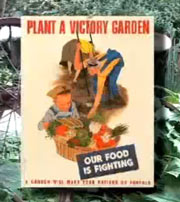It's Organic: Timeless Food Values
Organic Agriculture is Farming with Principles. To interact "in a life-enhancing way" with plants, animals, soils, and water supplies; to eliminate polluting outputs; and to conserve and recycle natural resources. Organic agriculture works in a closed system, building organic materials and nutrients, making use of livestock fertilizers. And the obvious outcome that most people recognize- to produce food of high nutritional quality. .
Access to Healthy Food = Social Equity
If each and every one of us wanted to preserve, protect, and perpetuate our access to healthy food, what would this entail?
- Healthy seed that grows, and adapts to the place where we live for our long-term subsistence
- Healthy soil to support a food ecosystem
- Healthy water and air to add to its soil nutrient intake
- A small patch of land where these ingredients are available
- Time and ability to sow, tend, harvest, and regenerate
- A community to share the work and celebration of producing local healthy food
Edutainment
What is Slow Food?University of Maine Cooperative Extension's John Jemison explains the goals of the slow food movement. 1. Change role of being food consumers to being co-producers. Original file location: http://youtu.be/pHVUX13G1h0 |
Nature's RightA seed fulfills a plant's reproductive right. Saving seed is an act of stewardship of nature's rights. Dr. Vandana Shiva, on seed saving (3 minutes): Every law in the world that makes seed saving illegal is aimed at creating corporate seed monopolies. Original file location: http://youtu.be/c2k0CLSSvEw |
Victory Garden
Original file location: http://youtu.be/-APWqoyw9Kw |
What is Organic Agriculture?
Principles
Organic agriculture is a production system that sustains the health of soils, ecosystems and people. It relies on ecological processes, biodiversity and cycles adapted to local conditions, rather than the use of inputs with adverse effects. Organic agriculture combines tradition, innovation and science to benefit the shared environment and promote fair relationships and a good quality of life for all involved.
IFOAM organic principles
The guiding worldwide principles for organic agriculture are defined by the International Federation of Organic Agricultural Movements (IFOAM) and are detailed below:
-
To produce food of high nutritional quality in sufficient quantity
-
To interact in a constructive and life-enhancing way with natural systems and cycles
-
To encourage and enhance biological cycles within the farming system, involving micro organisms, soil flora and fauna, plants and animals
-
To maintain and increase long-term fertility of soils
-
To promote the healthy use and proper care of water, water resources and all life therein
-
To help in the conservation of soil and water
-
To use, as far as possible, renewable resources in locally organised agricultural systems
-
To work, as far as possible, within a closed system with regard to organic matter and nutrient elements
-
To work, as far as possible, with materials and substances that can be reused or recycled, either on the farm or elsewhere
-
To give all livestock conditions of life which allow them to perform basic aspects of their innate behaviour
-
To minimise all forms of pollution that may result from agricultural practice
-
To maintain the genetic diversity of the agricultural system and its surroundings, including the protection of plant and wildlife habitats
-
To allow everyone involved in organic production and processing a quality of life conforming to the UN Human Rights Charter, to cover their basic needs and obtain an adequate return and satisfaction from their work, including a safe working environment
-
To consider the wider social and ecological impact of the farming system.
-
To produce non-food products out of renewable resources, which are fully biodegradable
-
To encourage organic farming associations to function along democratic lines and the principle of division of powers
-
To progress towards an entire organic production chain, which is both socially just and ecologically responsible
- Copied from: About Organics

